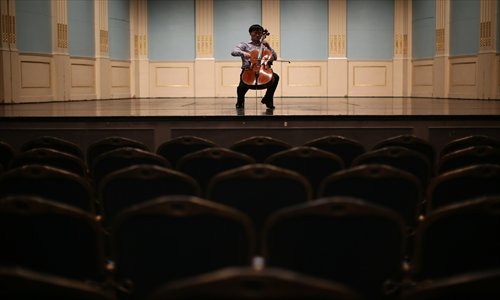Wang Jian
The world-renowned China-born cellist Wang Jian is only 45, but he says he has experienced the cycle of death and rebirth many times - whenever he plays Bach's Six Suites for Solo Cello.
"Every time when I'm playing Bach, I feel like I have turned into an old man who is coming to the end of his life and beginning to look back at his whole existence by himself," Wang said, "and the sense of deep sorrow inside is very private and unspeakable, touching the soul directly so that I'm always sucked in for a long time.''
Bach's six suites contain six movements each: a formal prelude followed by a dance music-based allemande, a courante, a sarabande, a galanterie, and ending with a gigue.
According to Wang, the six movements all have six distinctive characters and the whole set displays a stately progression from simple to complex, from naive to profound.
"It is exactly like a person's whole life," Wang added.

The renowned cellist Wang Jian plays his 500-year-old cello. Photos: Courtesy of Shanghai Concert Hall
Indeed, these six suites have accompanied Wang's entire musical career. As a cellist who started to study music at the age of 4, Wang began to practice Bach's cello suites when he was a teenager, and he performed all of them in his 20s. In 2004, Wang recorded the whole six suites for the first time.
"To be honest, at first, I did not especially love them because they are too complex. But they have finally turned into a home for my soul as I grow and play more and more. It is the music that I play for myself," Wang said.
On the eve of his two recitals of Bach's Six Suites for Solo Cello in Shanghai, Wang told the Global Times that, deep down, compared to giving a public performance of Bach's works, he prefers to play Bach privately.
"Because I think they are most suitable for playing alone," he said, "and I always play them just at home, only for myself."
During the interview, Wang points at the cello case at his feet and tells us that the pattern on the case is Bach's original manuscripts, which are all torn into pieces.
Unlike Bach who led a tough life and whose talents as a composer weren't widely recognized during his lifetime, Wang has enjoyed a smooth music career. "I'm fortunate since I have several people who helped me a lot when I started my career," he said.
The instrument that Wang takes along for touring has accompanied him for more than 20 years. An ancient Italian Amati cello made almost 500 years ago, it originally belonged to a Chinese-American entrepreneur and instrument collector, Lam Sau-wing, who lent it to Wang when the young cellist entered the Juilliard School in 1988.
Previously, Lam had sponsored Wang to study at the Yale School of Music for three years.
As well as Lam, the famous Soviet-born violinist Isaac Stern and the American cellist who taught him at Yale, Aldo Parisot, were also instrumental in helping the budding Wang.
In 1979 and 1982, on separate visits to China, they both saw Wang playing the cello in Shanghai.
At the time, Wang was a student at the affiliated school of the Shanghai Conservatory of Music. Stern was amazed by the 10-year-old boy's performance, which was captured in the Oscar-winning documentary From Mao to Mozart: Isaac Stern in China.
Wang told us that he didn't encounter too many difficulties during his time studying abroad. "Only one time, my first night in America. I heard the sound of a plane flying overhead, and at that moment, I really hoped that the plane would land immediately and take me home," Wang recalled.
In 1990, Wang performed at Stern's 70th birthday concert, and five years later, became the first Chinese musician to sign with the legendary German classical record label Deutsche Grammophon.
After that, Wang said that he welcomed the peak of his career and received lots of invitations to work with virtuosos such as the Russian cellist Mstislav Rostropovich, the French flautist Jean-Pierre Rampal and the Taiwanese American violinist Cho-liang Lin.
However, for a cellist of his stature, Wang's public performances are relatively few and far between. "I'm not a musician who likes to perform," he said. "The annual number usually stays at 50 to 60, and this year is a little more, reaching over 75."
"Of course, that number refers to solo concerts and I always try to hold solo concerts for the cello," Wang added.
Wang's two upcoming Shanghai recitals will be held at the Shanghai Concert Hall on November 14 and 15 as part of the 15th Shanghai International Arts Festival.
It will be the first time that Wang will perform the entirety of Bach's Six Suites for Solo Cello in Shanghai. In 2007, he played the six suites in Beijing at a very special venue, the Wangfujing Church.
"Bach's works can be regarded as church music, which contain a great sense of praying, helping people to think and self-examine," Wang said.
He emphasized that, although Bach's music sounds sad and low, which is just like the sound of the cello, it doesn't mean that his music is gloomy or pessimistic. "It can teach people to be grateful and to continually think about life and yourself," he said.